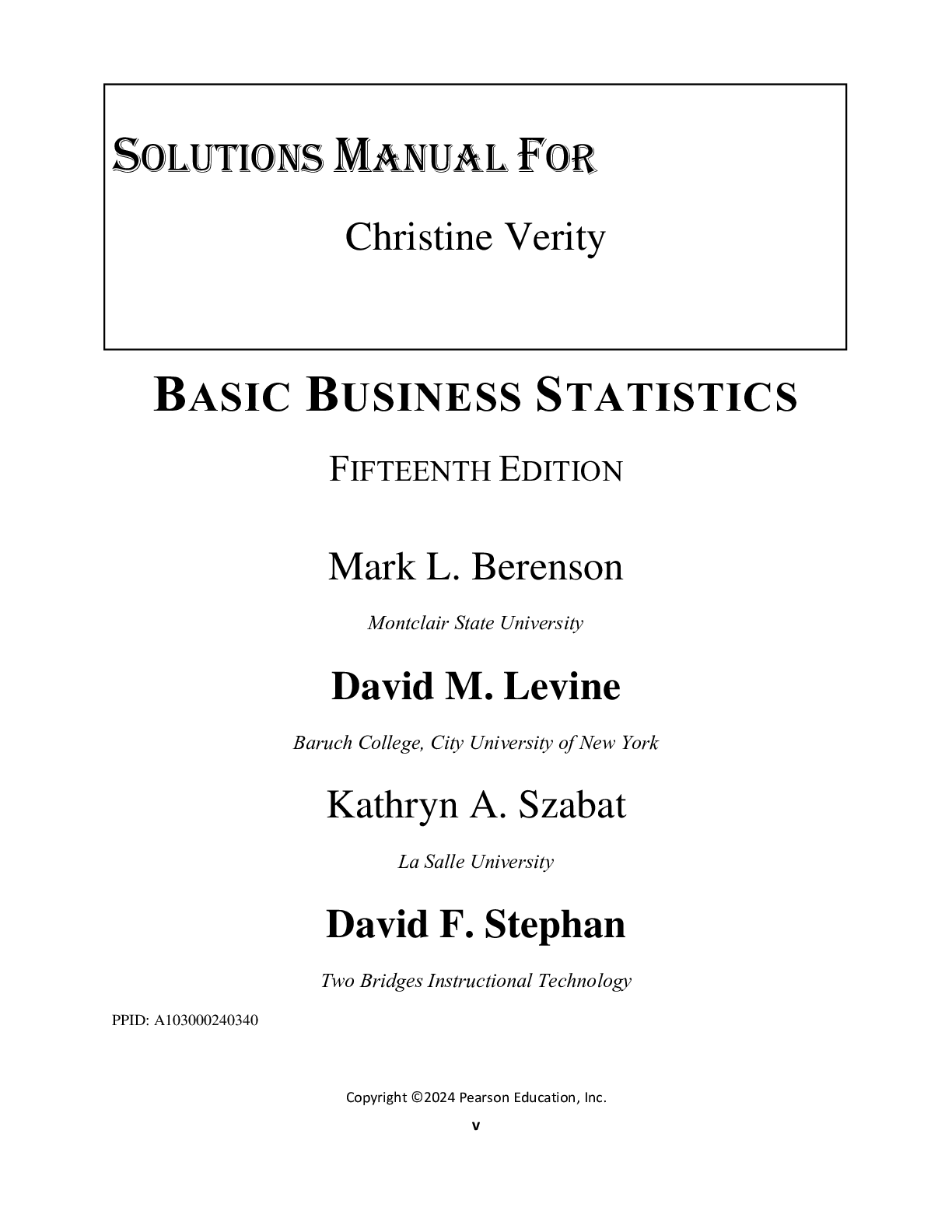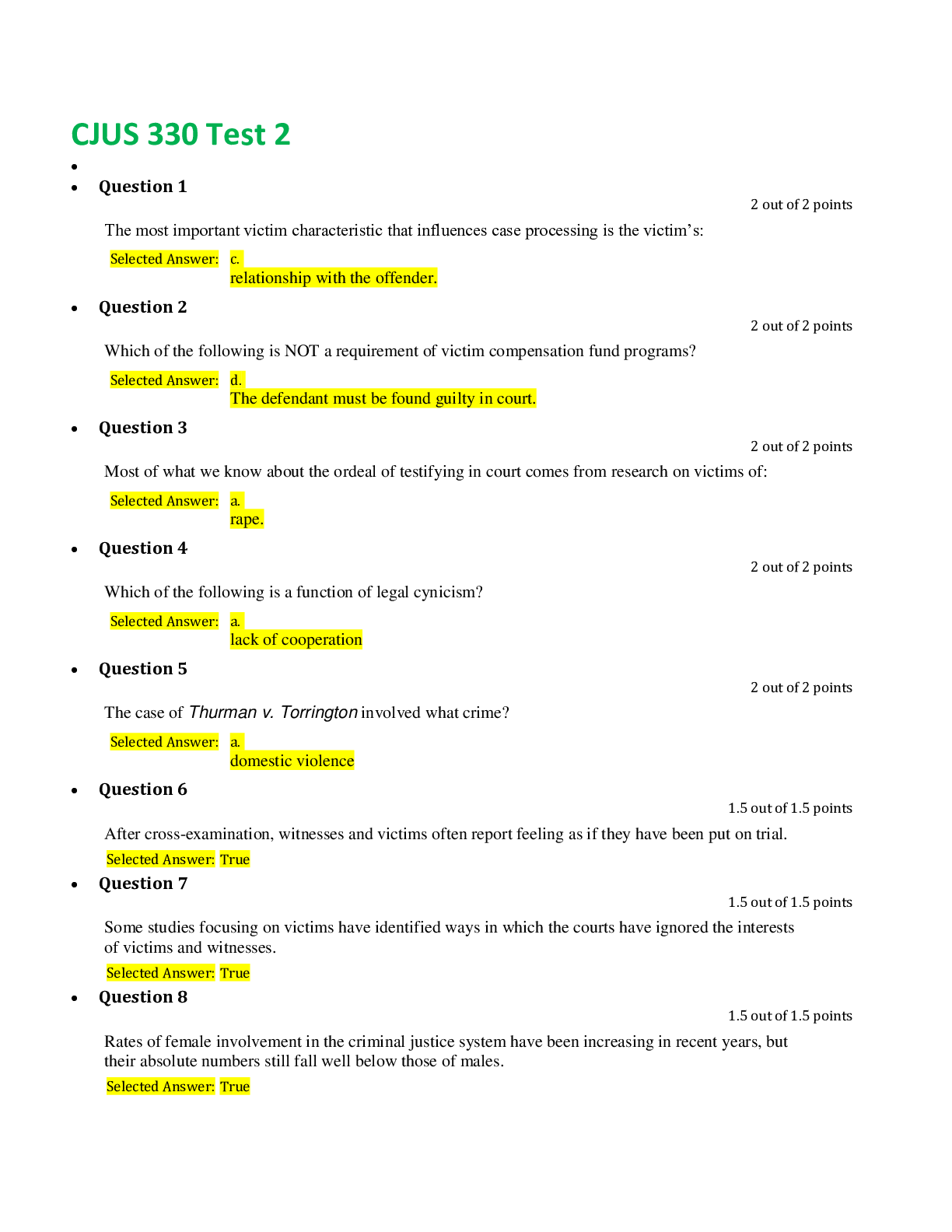
Solution Manual For Basic Business Statistics, 15th Edition by Mark L. Berenson David M. Levine David F. Stephan 2024 Chapter 1-20 OLS (1-10)
CJUS 330 Test 2 • • Question 1 2 out of 2 points The most important victim characteristic that influences case processing is the victim’s: • Question 2 2 out of 2 points ... Which of the following is NOT a requirement of victim compensation fund programs? • Question 3 2 out of 2 points Most of what we know about the ordeal of testifying in court comes from research on victims of: • Question 4 2 out of 2 points Which of the following is a function of legal cynicism? • Question 5 2 out of 2 points The case of Thurman v. Torrington involved what crime? • Question 6 1.5 out of 1.5 points After cross-examination, witnesses and victims often report feeling as if they have been put on trial. • Question 7 1.5 out of 1.5 points Some studies focusing on victims have identified ways in which the courts have ignored the interests of victims and witnesses. • Question 8 1.5 out of 1.5 points Rates of female involvement in the criminal justice system have been increasing in recent years, but their absolute numbers still fall well below those of males. • Question 9 1.5 out of 1.5 points Today, very few jurisdictions of any size have programs aimed at helping crime victims cope with the hardships of victimization. • Question 10 1.5 out of 1.5 points The more poverty in a community, the higher the amount of crime. • Question 11 0 out of 2 points Who is the prosecutor’s client? • Question 12 2 out of 2 points Which of the following decisions is the exclusive domain of the prosecutor? • Question 13 2 out of 2 points Who are U.S. attorneys appointed by? • Question 14 2 out of 2 points Which of the following is NOT a term used to refer to chief prosecutors? • Question 15 2 out of 2 points CASE 6.1 The U.S. attorneys serve as the nation’s principal litigators under the direction of the attorney general. One U.S. attorney is assigned to each of the judicial districts, with the exception of Guam and the Northern Mariana Islands, where one serves both districts. Each U.S. attorney is the chief federal law enforcement officer of the United States within his or her particular jurisdiction. How many U.S. attorneys are stationed throughout the United States, Puerto Rico, the Virgin Islands, Guam, and the Northern Mariana Islands? • Question 16 1.5 out of 1.5 points More so than judges and defense attorneys, the prosecutor is the most powerful official in the criminal courts. • Question 17 1.5 out of 1.5 points The role of the prosecutor involves little discretion. • Question 18 1.5 out of 1.5 points Some states still permit private criminal prosecutions. • Question 19 1.5 out of 1.5 points Appellate courts cannot place restrictions on the exercise of prosecutorial power during the trial itself. • Question 20 1.5 out of 1.5 points Programs aimed at improving police–prosecutor relationships and community prosecution are two contemporary examples of the expanding domain of the prosecutor. • Question 21 2 out of 2 points The method by which defense attorneys seek to reach the best possible solution for their clients is directly related to their relationships with other members of: • Question 22 2 out of 2 points The right to self-representation is also referred to by the Latin term: • Question 23 2 out of 2 points The three major ways of providing indigents with court appointed attorneys are: (1) assigned counsel, (2) contract systems, and (3) public defender. Which of the following is true about these differing ways of providing indigents with court appointed attorneys? • Question 24 2 out of 2 points Which type of law do most lawyers practice? • Question 25 2 out of 2 points CASE 7.1 Like many other provisions of the U.S. Constitution, the Sixth Amendment has a different meaning today than it did when it was first ratified. In a landmark decision, the U.S. Supreme Court held that, based on the Sixth Amendment’s provision of right to counsel, indigent defendants charged with a felony are entitled to the services of a lawyer paid for by the government (Gideon v. Wainwright, 1963). Later, the Sixth Amendment right to counsel was extended to juvenile court proceedings as well (In re Gault, 1967). But as so often happens, answering one question raised several new ones. Which of the following issues did the court wrestle with following the Gideon decision? • Question 26 1.5 out of 1.5 points The Sixth Amendment provides for the right to counsel in “all criminal prosecutions,” so it is not limited to the trial itself. • Question 27 0 out of 1.5 points The public defender is the 19th century response to the problem of providing legal representation for the indigent. • Question 28 1.5 out of 1.5 points Criminal lawyers are more concerned than other lawyers with collection of the fee—after all, their clients are mostly criminals. • Question 29 1.5 out of 1.5 points Lawyers must always do what their clients ask them to do. • Question 30 1.5 out of 1.5 points Public clients are skeptical about the skills of their lawyers. • Question 31 2 out of 2 points According to news reports, at least __________ federal judges are openly gay. • Question 32 0 out of 2 points About __________ of Supreme Court justices had been judges on lower courts prior to being nominated to the U.S. Supreme Court. • Question 33 2 out of 2 points Which form of judicial selection is supported as a way to sift out unqualified applicants? • Question 34 0 out of 2 points Each of the following states allows for nonpartisan election in the high court of last resort EXCEPT: • Question 35 2 out of 2 points Merit selection is commonly referred to as the: • Question 36 1.5 out of 1.5 points A judge may decide that a case cannot continue on to trial because s/he believes there is no probable cause that an offense was committed. • Question 37 1.5 out of 1.5 points In operation, the Missouri Bar Plan increases the power and role of the legal profession in judicial selection. • Question 38 1.5 out of 1.5 points Campaigns for American judgeships are not usually low-key or low-visibility affairs. • Question 39 1.5 out of 1.5 points “Judge shopping” rarely occurs in large urban courts. • Question 40 1.5 out of 1.5 points Judges who fail to move their docket may be transferred to less desirable duties. • Question 41 Needs Grading Explain the difference between absolute immunity and qualified immunity for prosecutors. • Question 42 Needs Grading In general, “justice delayed is justice denied.” Explain the meaning of this phrase and how it affects defendants. What steps have legislatures taken to deal with the problem of court delay? Have these steps been effective? [Show More]
Last updated: 3 years ago
Preview 1 out of 6 pages

Buy this document to get the full access instantly
Instant Download Access after purchase
Buy NowInstant download
We Accept:

Can't find what you want? Try our AI powered Search
Connected school, study & course
About the document
Uploaded On
Oct 17, 2020
Number of pages
6
Written in
All
This document has been written for:
Uploaded
Oct 17, 2020
Downloads
0
Views
127
Scholarfriends.com Online Platform by Browsegrades Inc. 651N South Broad St, Middletown DE. United States.
We're available through e-mail, Twitter, Facebook, and live chat.
FAQ
Questions? Leave a message!
Copyright © Scholarfriends · High quality services·